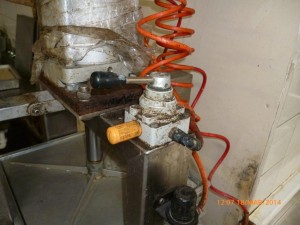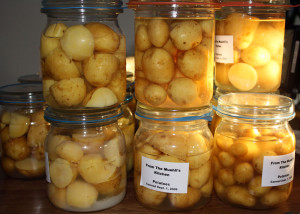Here’s a video featuring farmer Jeff from 2003, before youtube existed.
And an abstract from a paper just published.
 Same questions, not many solutions.
Same questions, not many solutions.
Irrigation water has been implicated as a likely source of produce contamination by Salmonella enterica. Therefore, the distribution of S. enterica was surveyed monthly in irrigation ponds (n=10) located within a prime agricultural region in Southern Georgia and Northern Florida.
All ponds and 28.2% of all samples (n=635) were positive for Salmonella with an overall geometric mean concentration (0.26 MPN/L) that was relatively low compared to prior reports for rivers in this region. Salmonella peaks were seasonal; levels correlated with increased temperature and rainfall (p<0.05). Numbers and occurrence were significantly higher in water (0.32 MPN/L and 37%) compared to sediment (0.22 MPN/L and 17%) but did not vary with depth. Representative isolates (n=185) from different ponds, sample types, and seasons were examined for resistance to 15 different antibiotics; most strains were resistant to streptomycin (98.9%), while 20% were multidrug resistant (MDR) for 2-6 antibiotics.
DiversiLab rep-PCR revealed genetic diversity and showed 43 genotypes among 191 isolates, as defined by >95% similarity. Genotypes did not partition by pond, season, or sample type. Genetic similarity to known serotypes indicated Hadar, Montevideo, and Newport as the most prevalent. All ponds achieved the current safety standards for generic Escherichia coli in agricultural water, and regression modeling showed E. coli levels were a significant predictor for the probability of Salmonella occurrence. However, persistent populations of Salmonella were widely distributed in irrigation ponds, and associated risks for produce contamination and subsequent human exposure are unknown, supporting continued surveillance of this pathogen in agricultural settings.
Distribution and Characterization of Salmonella enterica Isolates from Irrigation Ponds in the Southeastern U.S.A.
Applied and Environmnetal Microbiology
Zhiyao Luo, Ganyu Gu, Amber Ginn, Mihai C. Giurcanu, Paige Adams, George Vellidis, Ariena H. C. van Bruggen, Michelle D. Danyluk, and Anita C. Wright
http://aem.asm.org/content/early/2015/04/20/AEM.04086-14.abstract









 d lack of soaps in the workers’ washrooms. According to the SOP, the restaurant should have been sealed but it was fined Rs25,000 instead.
d lack of soaps in the workers’ washrooms. According to the SOP, the restaurant should have been sealed but it was fined Rs25,000 instead.